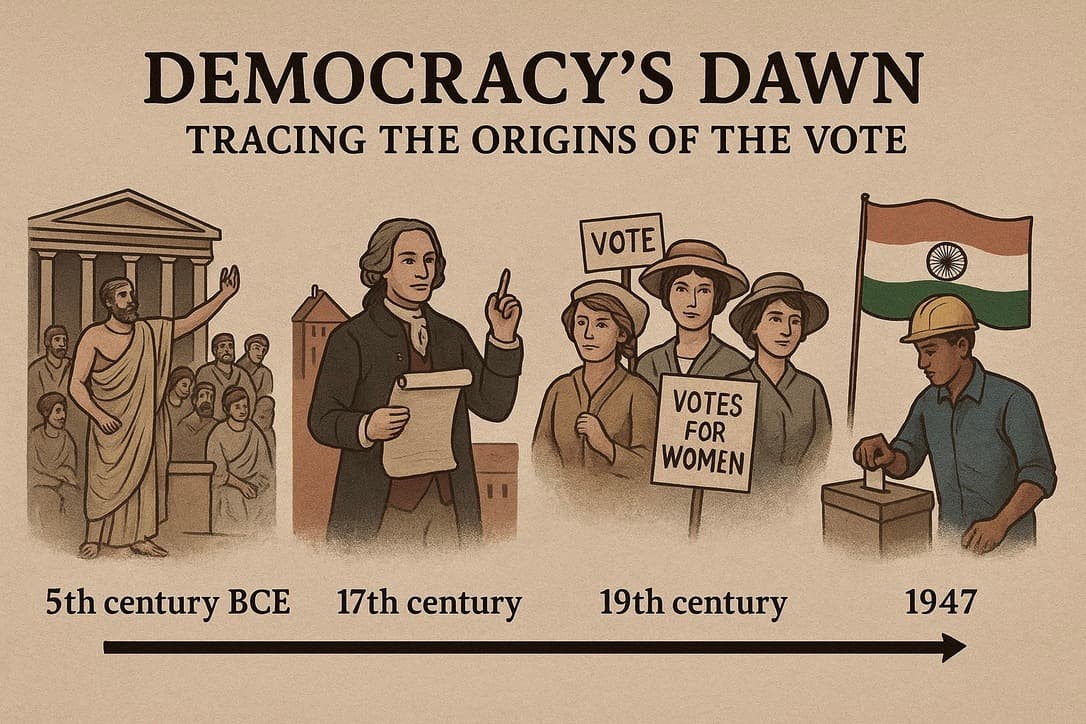Democracy's Dawn: Origin of the Vote

The right to vote — a simple mark on paper, a tap on a screen — stands today as one of humanity's most profound symbols of freedom.
Democracy's Dawn: Origin of the Vote
The right to vote — a simple mark on paper, a tap on a screen — stands today as one of humanity's most profound symbols of freedom. Yet this universal act, so integral to modern democracy, is the product of centuries of struggle, reform, and evolution.
Ancient Origins
The roots of democracy lie in ancient Greece, particularly in 5th century BCE Athens, where citizens gathered in the Ekklesia to decide state affairs. But the Athenian democracy was deeply exclusionary — women, slaves, and non-citizens were denied participation.
Evolution Through History
As history unfolded, the Roman Republic and early European assemblies carried forward this idea of civic deliberation, but the vote itself remained confined to the elite.
The Enlightenment Era
It was only after centuries of political awakening — particularly through the Age of Enlightenment and revolutions in the 17th and 18th centuries — that the concept of the vote as an inalienable right began to emerge.
Key Revolutionary Moments
- Glorious Revolution (1688) in England
- American Revolution (1776)
- French Revolution (1789)
These movements declared that legitimate power must flow from the will of the people, not the privilege of birth.
The Path to Universal Suffrage
However, the path to universal suffrage was far from immediate. Even in the early democracies of the 19th century, voting was restricted by:
- Property ownership
- Gender
- Race
It took the relentless persistence of reformers, suffragists, and civil rights leaders for the world to recognize that democracy could not coexist with exclusion.
India's Democratic Revolution
India's embrace of democracy after independence in 1947 was nothing short of revolutionary. Unlike many nations that granted suffrage gradually, India introduced universal adult franchise from the very first general election in 1951–52.
A Bold Declaration
At a time when less than one-third of the world's population lived under democratic systems, India's decision stunned the world. It was a bold declaration that democracy was not a Western export, but a universal ideal rooted in dignity and participation.
Modern Democratic Participation
In contemporary times, civic participation continues to evolve. Initiatives like Janseva, which works to enhance access to government services and voter registration among blue-collar workers, reflect democracy's modern challenge — inclusion through innovation.
Technology and Democracy
By leveraging technology to connect marginalized citizens with their democratic rights, Janseva embodies the same spirit that fueled the world's earliest movements for suffrage: empowerment through awareness.
Conclusion
The story of the vote is, ultimately, the story of humanity's faith in itself — the belief that ordinary citizens, regardless of origin or occupation, can shape the destiny of their nations.
As India and the world continue to strengthen democratic institutions, remembering democracy's dawn reminds us that each ballot cast is not just a choice, but a continuation of history's most enduring promise — freedom through representation.
Get Involved
Want to learn more about civic engagement and government schemes?
